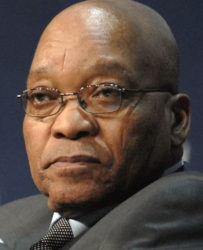PRETORIA, (Reuters) – South Africa’s anti-graft watchdog called for a judge to investigate allegations of influence peddling in President Jacob Zuma’s government, in a report released yesterday as thousands of protesters called for the president to step down.
The 355-page report, titled “State of Capture”, stopped short of reaching conclusive findings, but is likely to add to pressure on Zuma by demanding a full inquiry within 30 days into the biggest crisis of his scandal-plagued presidency.
The report was finally released after the president withdrew a court bid earlier on Wednesday that had sought to delay its publication.
Police fired stun grenades and used water cannon to disperse demonstrators who had marched to the Union Buildings, where Zuma’s offices are located. Outside the High Court, protesters carried “Zuma must go” placards.

Zuma denies providing special favours for wealthy friends, including three brothers who run a business empire from media to mining and who also deny wrongdoing.
The carefully-worded report stopped short of asserting that crimes had been committed, saying the watchdog lacked the resources to reach such conclusions.
It focused on allegations that the brothers, Ajay, Atul and Rajesh Gupta, influenced the appointment of ministers, and called for an investigation into whether Zuma, some of his cabinet members and some state companies acted improperly.
In one case it cited “extraordinary and unprecedented” government intervention in a private business dispute involving Zuma’s friends and his son. This, it said, may have created “a possible conflict of interest between the President as head of state and his private interest as a friend and father”.
The affair has rattled markets in Africa’s most industrialised economy, which faces the risk of ratings downgrades later this year. Divisions within the African National Congress (ANC) have widened since the ruling party suffered its worst-ever local election results in August.
The rand rose by as much as 2 percent to the dollar when the court ordered that the report be released, although it later pared some of its gains. Analysts said allowing the report to be released was an indication the country still had strong institutions.
The release of the report has been a central demand of Zuma’s opponents since its publication was suspended on Oct. 14, the day its author, Thuli Madonsela, reached the end of her tenure as public protector, South Africa’s anti-graft watchdog.
The presidency said in a statement that Zuma had decided “in the interests of justice” to withdraw his bid to delay it.
Political analyst Gary van Staden of NKC African Economics said although the cautiously-worded report did not carry a knock-out punch, it had piled even more pressure on Zuma.
“The way Zuma was rushing to stop this thing, we were waiting for something explosive. It certainly doesn’t seem to contain the kind of information everyone seemed to think it might,” Van Staden said.
Daniel Silke, a director at Political Futures Consultancy, said, the findings of the report would weaken Zuma, adding strength to calls for his early exit.
“He now faces a very awkward judicial inquiry which in itself could unleash criminal or court action,” Silke said.
Since taking office in 2009, Zuma, 74, has survived several corruption scandals with the backing of top echelons of the ANC.
In March, the Constitutional Court ordered Zuma to repay some of $16 million spent on enhancing his Nkandla home in rural KwaZulu-Natal province. Zuma, who weathered a motion of no-confidence in parliament over the cost of the renovations, has since paid back more than $500,000 as required by the court.
But near record unemployment has exacerbated discontent with his government, which also failed to end weeks of often violent student demonstrations over the cost of university education.
Protesters demanded that state prosecutor Shaun Abrahams be removed from office. Abrahams had pressed charges of fraud against Finance Minister Pravin Gordhan, but then dropped them on Monday after popular support for him from the worlds of politics and business.
Supporters of Gordhan said the charges against him could have been a ploy to discredit Gordhan for standing in the way of graft. The president has denied he is in conflict with Gordhan.
In a sign of the country’s establishment turning sharply against Zuma, the Nelson Mandela Foundation, a charity founded by South Africa’s first black president, blamed Zuma on Tuesday for the “wheels coming off” South Africa.
About 40 CEOs of mostly listed companies have joined in calls for new political leadership. Among companies coming forward were technology investment firm Naspers, Africa’s biggest company by market value, Standard Bank , the continent’s biggest bank by assets, and Telkom , the partially privatised former telecoms monopoly.
Opposition leaders said Zuma, who has shown no signs of stepping down before his second and final term as president is up in 2019, should leave office now.
“We don’t want Zuma, he has no credibility,” said Julius Malema, leader of the radical leftist party Economic Freedom Fighters who called for Wednesday’s marches as a show of force against Zuma.
“Jacob Zuma is unfit to hold office,” Mmusi Maimane, the leader of the main opposition Democratic Alliance party, said.
Paul Mashatile, ANC chairman for Gauteng province which includes Pretoria and the economic hub Johannesburg, said his group would take part in the marches, even without the blessing of the national party.
“I do not have the mandate to say the president must step down, but I can say we are against all the wrong things that are happening, including corruption,” he told eNCA television.
He said the party had to change after its August hammering in municipal polls, its worst electoral losses since Mandela’s historic victory in the first post-apartheid election in 1994.
